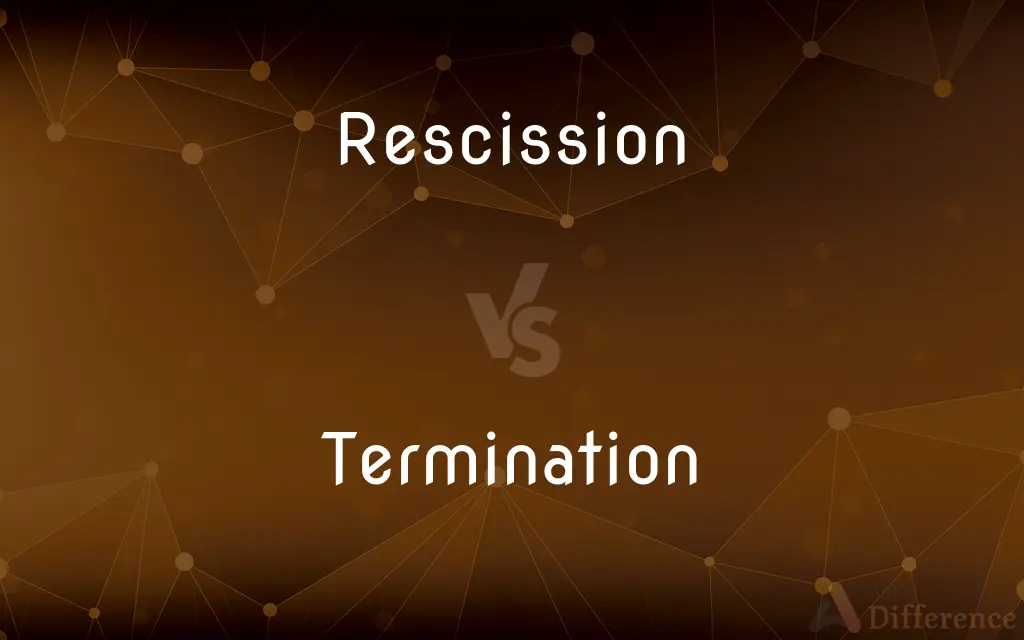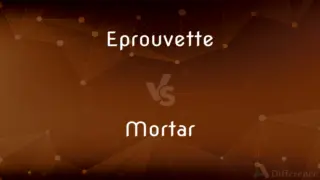Rescission vs. Termination — What's the Difference?
By Tayyaba Rehman & Urooj Arif — Updated on March 24, 2024
Rescission involves undoing a contract as if it never existed, focusing on mutual return of benefits, while termination ends a contract's future obligations but acknowledges its past validity.

Difference Between Rescission and Termination
Table of Contents
ADVERTISEMENT
Key Differences
Rescission is a legal remedy that effectively nullifies a contract, allowing both parties to return to their pre-contractual states, as though the agreement never existed. Whereas termination, on the other hand, brings a contract to an end, either at an agreed-upon time, by mutual agreement, or due to breach by one of the parties. Unlike rescission, termination does not erase the history of the contract; it simply stops any future obligations from continuing. While any benefits conferred are generally not returned upon termination, damages may be sought for breaches leading up to the termination.
Rescission can be seen as a form of remedy that addresses the validity of the contract itself from its inception, focusing on issues that might make the contract void or voidable. In contrast, termination relates to the cessation of a contract's terms moving forward, without disputing the contract's initial validity. This distinction highlights rescission’s role in addressing foundational issues of the contract, such as fraud or mistake, which if proven, can lead to the contract's annulment.
The process of rescission often requires court intervention to ensure that all parties are fairly returned to their original states, especially when the parties cannot agree on the terms of the rescission. Termination, however, can sometimes be executed by the parties themselves, in accordance with the termination provisions outlined in the contract. This illustrates the procedural differences between the two, with rescission typically being more complex and requiring judicial review.
In terms of effect, rescission treats the contract as if it had never happened, effectively erasing the contractual relationship from a legal standpoint. Termination acknowledges the contract’s existence and its consequent rights and obligations up until the point of termination. Therefore, rescission can have more far-reaching implications, especially regarding the recovery of benefits or property transferred under the contract.
The reasons behind rescission and termination can differ significantly. Rescission is primarily sought due to defects at the contract's formation, such as misrepresentation or undue influence, aiming to correct a wrong. Termination, however, may be sought for reasons unrelated to the contract's formation, such as unsatisfactory performance or the occurrence of a condition precedent that releases the parties from their obligations.
ADVERTISEMENT
Comparison Chart
Purpose
Nullify contract to pre-contractual state
End future obligations without denying past validity
Legal Basis
Misrepresentation, fraud, duress
Breach, mutual agreement, expiry
Effect on Contract
Acts as if contract never existed
Acknowledges contract's past validity
Requirement for Restoration
Yes, parties must return to original positions
No, but damages may be sought
Judicial Intervention
Often required
Not always necessary
Compare with Definitions
Rescission
A way to address contracts that are void or voidable.
The contract's rescission was based on undue influence exerted on the buyer.
Termination
Conclusion of a contract by fulfillment, breach, or mutual agreement.
Upon project completion, the contract was due for termination.
Rescission
Legal remedy to nullify contracts in cases of fraud or misrepresentation.
The court granted rescission due to the seller's undisclosed defects.
Termination
The act of ending a contract’s terms and obligations.
The company issued a termination of the contract due to breach of terms.
Rescission
Undoing a contract without penalty to either party.
They agreed to a rescission after realizing a mutual mistake in the contract terms.
Termination
Ceasing of contract obligations due to various reasons.
The termination was mutually agreed upon after renegotiating the contract’s terms.
Rescission
Process to restore parties to their original state before the contract.
Rescission of the agreement required the seller to return the deposit.
Termination
Process of discontinuing the contractual relationship moving forward.
Termination clauses allow either party to end the contract under specific conditions.
Rescission
The act of cancelling a contract to return parties to their pre-contractual positions.
After discovering the car was stolen, the buyer sought a rescission of the sale.
Termination
Legal ending of a contract without negating its previous effects.
Termination of the lease did not affect the payments already made.
Rescission
The act of rescinding.
Termination
The action of terminating something or the fact of being terminated
The termination of a contract
Rescission
(Law) The termination of a contract by mutual agreement or as a result of fraud or some legal defect.
Termination
A word's final syllable or letters or letter, especially when constituting an element in inflection or derivation.
Rescission
An act of rescinding: removing, taking away, or taking back.
Termination
An ending or result of a specified kind
A good result and a happy termination
Rescission
(legal) The undoing of a contract; repeal.
Termination
The act of terminating or the condition of being terminated.
Rescission
The act of rescinding, abrogating, annulling, or vacating; as, the rescission of a law, decree, or judgment.
Termination
The end of something in time; the conclusion.
Rescission
(law) the act of rescinding; the cancellation of a contract and the return of the parties to the positions they would have had if the contract had not been made; recission may be brought about by decree or by mutual consent
Termination
An end of something in space; a limit or edge.
Termination
A result; an outcome.
Termination
(Linguistics) The end of a word, as a suffix, inflectional ending, or final morpheme.
Termination
The process of terminating or the state of being terminated.
Termination
The process of firing an employee; ending one's employment at a business for any reason.
Termination
An end in time; a conclusion.
Termination
An end in space; an edge or limit.
Termination
An outcome or result.
Termination
(grammar) The last part of a word; an ending, a desinence; a suffix.
Termination
(medical) An induced abortion.
Termination
A word, a term.
Termination
The ending up of a polypeptid chain.
Termination
The act of terminating, or of limiting or setting bounds; the act of ending or concluding; as, a voluntary termination of hostilities.
Termination
That which ends or bounds; limit in space or extent; bound; end; as, the termination of a line.
Termination
End in time or existence; as, the termination of the year, or of life; the termination of happiness.
Termination
End; conclusion; result.
Termination
Last purpose of design.
Termination
A word; a term.
Termination
The ending of a word; a final syllable or letter; the part added to a stem in inflection.
Termination
A coming to an end of a contract period;
The expiry of his driver's license
Termination
A place where something ends or is complete
Termination
Something that results;
He listened for the results on the radio
Termination
The end of a word (a suffix or inflectional ending or final morpheme);
I don't like words that have -ism as an ending
Termination
The act of ending something;
The termination of the agreement
Common Curiosities
What is termination?
Termination is the ending of a contract's obligations, either through completion, mutual agreement, or breach.
What leads to the termination of a contract?
Termination can occur due to breach, completion of the contract terms, or mutual agreement.
How does rescission differ from termination?
Rescission nullifies a contract to treat it as if it never existed, while termination ends future obligations without denying the contract's past effects.
When is rescission typically sought?
It is sought in cases of fraud, misrepresentation, or when the contract is void or voidable.
What is rescission?
Rescission is the legal cancellation of a contract, returning both parties to their original states as if the contract had never been made.
Is rescission possible for all contracts?
Rescission is typically reserved for contracts that are voidable due to specific reasons like misrepresentation or duress.
Is it necessary to return benefits received under a terminated contract?
No, benefits are not typically returned upon termination, but damages may be sought for breaches leading up to it.
Can a contract be terminated by one party alone?
Yes, if the contract includes provisions allowing unilateral termination under certain conditions.
What is a common reason for mutual termination?
A common reason is the realization by both parties that the contract’s objectives cannot be achieved as initially planned.
What happens to the contractual relationship after rescission?
The contractual relationship is treated as if it never existed, effectively erasing the legal bond between the parties.
Can termination affect the validity of past contractual acts?
No, termination stops future obligations but does not negate past acts or their legal validity.
Can rescission happen without court intervention?
While possible, rescission often requires judicial review to ensure fairness and the return of parties to their original states.
Does termination always involve a breach?
No, contracts can be terminated for reasons other than breach, such as by mutual agreement or upon reaching the contract's natural end.
What role does a court play in contract rescission?
Courts often determine the fairness of rescission, ensuring that both parties are returned to their pre-contractual states.
Share Your Discovery

Previous Comparison
Lad vs. Lass
Next Comparison
Eprouvette vs. MortarAuthor Spotlight
Written by
Tayyaba RehmanTayyaba Rehman is a distinguished writer, currently serving as a primary contributor to askdifference.com. As a researcher in semantics and etymology, Tayyaba's passion for the complexity of languages and their distinctions has found a perfect home on the platform. Tayyaba delves into the intricacies of language, distinguishing between commonly confused words and phrases, thereby providing clarity for readers worldwide.
Co-written by
Urooj ArifUrooj is a skilled content writer at Ask Difference, known for her exceptional ability to simplify complex topics into engaging and informative content. With a passion for research and a flair for clear, concise writing, she consistently delivers articles that resonate with our diverse audience.
















































